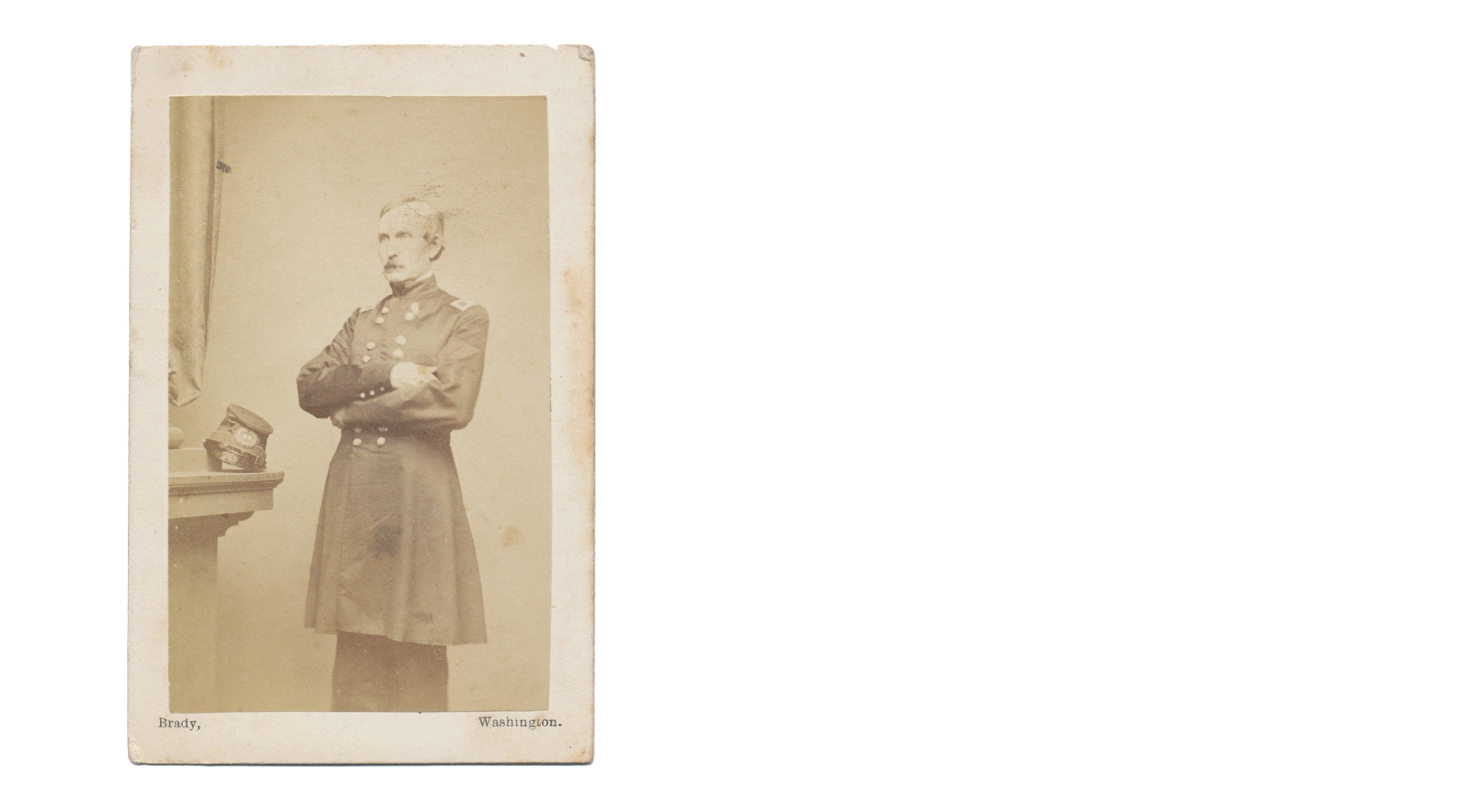site search
online catalog
THREE QUARTER STANDING VIEW OF GENERAL JOSEPH A. COOPER BY BRADY

$195.00 SOLD
Quantity Available: None
Item Code: 259-64
Image shows the General posed with his arms folded across his chest and standing by a draped column on which his forage cap rests.
The General wears a dark double-breasted frock coat with brigadier general’s shoulder straps and matching dark trousers. The front of his forage cap bears a U.S. inside of a wreath.
Image is clear with acceptable contrast. There is some light surface dirt on the mount and four small spots of discoloration, three of which are on the General’s coat. These are really minor in appearance. Bottom front of mount is marked in the corners “BRADY” and “WASHINGTON.”
Reverse is blank except for pencil inscription that reads “GENL. COOPER.”
Joseph Alexander Cooper was born November 25, 1823 on a farm in Whitley County, Kentucky, near Cumberland Falls. He and his parents moved to Campbell County, Tennessee, the following year.
During the Mexican War, Cooper enlisted as a private in the 4th Tennessee Infantry in September 1847. He remained with this regiment until mustered out in August 1848. He returned to Campbell County, and was involved in farming. While not a major landholder, he nevertheless saw a threefold increase in his personal estate from 1850 to 1860.
A Whig, Cooper supported Constitutional Union candidate John Bell in the 1860 presidential election. He attended both the Knoxville and Greeneville sessions of the East Tennessee Convention, which sought to create a new Union-aligned state in East Tennessee. He initially supported a set of resolutions that called for violent measures to be taken if the Convention's demands were not met, but gradually came to favor a more moderate set of resolutions.
While in Greeneville, Cooper made a pact with several other East Tennessee Convention delegates to return home and begin recruiting men to defend the region against a Confederate invasion. Cooper began rallying Unionists, farming by day, and recruiting at night. By August, he had recruited over 500 men.
Upon the approach of Confederate forces, Cooper and his new unit fled to Kentucky. He was mustered in as captain of Company A of the 1st Tennessee Infantry on August 4, 1861. He took part in operations around Cumberland Gap, and was present at Mills Springs in January 1862. In May 1862, Cooper was promoted to colonel and placed in command of the 6th Tennessee Infantry, which he organized and recruited.
In December 1862, he joined Union forces in Nashville. During the Battle of Stones River in early January 1863, Cooper and the 6th accompanied a supply train from Nashville to the front lines in Murfreesboro, and repulsed an attempt by Joseph Wheeler to capture the supplies. Cooper took part in the Knoxville Campaign in late 1863 and early 1864. In April 1864, Cooper commanded a brigade at Resaca, Georgia where it suffered a 30% casualty rate. He afterward took part in General William T. Sherman's Atlanta Campaign.
Cooper was promoted to brigadier general on July 30, 1864. He commanded a brigade of the 2nd Division of the XXIII Corps from June 4, 1864. At Utoy Creek he led two brigades in a charge and flanking movement of Armstrong’s Dismounted Cavalry Brigade of Bates Division along the Sandtown Road, on August 6, 1864. He temporarily obtained divisional command following Jonesborough.
Cooper was again in command of his brigade, and intermittently commanded the 2nd Division during the Franklin-Nashville Campaign. Upon reaching the front, he helped thwart Hood's assault on the city, charging and capturing two artillery pieces and a number of Confederate soldiers.
In January 1865, Cooper led the 2nd Division to North Carolina, where he took part in the fight at Bentonville. In March 1865, he was appointed a brevet major general in the Union Army for his service throughout the war, in particular for his actions at Nashville. He was mustered out on January 15, 1866.
After the war, Cooper moved to Knox County and engaged in politics. In August 1865, Cooper ran for the 2nd district seat in Congress but did not win. He rejected subsequent calls to run for the state legislature.
Cooper commanded the Tennessee State Guard in 1867 and 1869 to help quell unrest in the state.
In May 1869, President Ulysses S. Grant appointed Cooper internal revenue collector for the Knoxville District. He held this position until 1879.
In 1880, Cooper moved to Stafford County, Kansas, where he became involved in farming. He died at his home near St. John on May 20, 1910. His body was returned to Knoxville, Tennessee, where he was interred in the Knoxville National Cemetery. [ad]
~~~~~~~~~~~~~~~~~~~~~~~~~~~~~~~~~
THIS ITEM, AS WITH ALL OTHER ITEMS AVAILABLE ON OUR WEB SITE,
MAY BE PURCHASED THROUGH OUR LAYAWAY PROGRAM.
FOR OUR POLICIES AND TERMS,
CLICK ON ‘CONTACT US’ AT THE TOP OF ANY PAGE ON THE SITE,
THEN ON ‘LAYAWAY POLICY’.
THANK YOU!
Inquire About THREE QUARTER STANDING VIEW OF GENERAL JOSEPH A. COOPER BY BRADY
For inquiries, please email us at [email protected]
Most Popular
Historical Firearms Stolen From The National Civil War Museum In Harrisburg, Pa »
Theft From Gravesite Of Gen. John Reynolds »
Cavalry Carbine Sling Swivel »
Fine Condition Brass Infantry Bugle Insignia »
featured item
WORLD WAR TWO / KOREA UNITED STATES MARINE CORPS OFFICER’S MAMALUKE SWORD
The drawn sword meas. approx. 36.00 inches long. The blade itself meas. approx. 31.00 inches long x 0.75 of an inch wide at the ricasso. It has a central fuller that starts just above the ricasso and runs for approx. 27.00 inches. The blade surface… (2021-944). Learn More »



